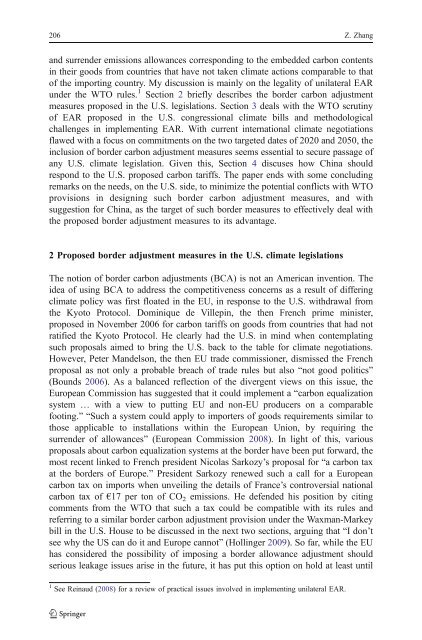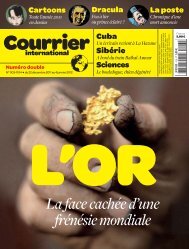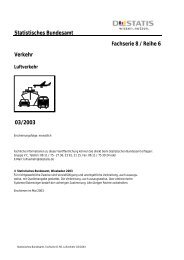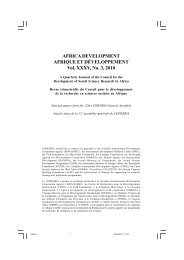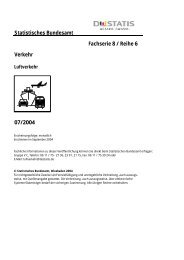The international economics of resources and resource ... - Index of
The international economics of resources and resource ... - Index of
The international economics of resources and resource ... - Index of
Create successful ePaper yourself
Turn your PDF publications into a flip-book with our unique Google optimized e-Paper software.
206 Z. Zhang<br />
<strong>and</strong> surrender emissions allowances corresponding to the embedded carbon contents<br />
in their goods from countries that have not taken climate actions comparable to that<br />
<strong>of</strong> the importing country. My discussion is mainly on the legality <strong>of</strong> unilateral EAR<br />
under the WTO rules. 1 Section 2 briefly describes the border carbon adjustment<br />
measures proposed in the U.S. legislations. Section 3 deals with the WTO scrutiny<br />
<strong>of</strong> EAR proposed in the U.S. congressional climate bills <strong>and</strong> methodological<br />
challenges in implementing EAR. With current <strong>international</strong> climate negotiations<br />
flawed with a focus on commitments on the two targeted dates <strong>of</strong> 2020 <strong>and</strong> 2050, the<br />
inclusion <strong>of</strong> border carbon adjustment measures seems essential to secure passage <strong>of</strong><br />
any U.S. climate legislation. Given this, Section 4 discuses how China should<br />
respond to the U.S. proposed carbon tariffs. <strong>The</strong> paper ends with some concluding<br />
remarks on the needs, on the U.S. side, to minimize the potential conflicts with WTO<br />
provisions in designing such border carbon adjustment measures, <strong>and</strong> with<br />
suggestion for China, as the target <strong>of</strong> such border measures to effectively deal with<br />
the proposed border adjustment measures to its advantage.<br />
2 Proposed border adjustment measures in the U.S. climate legislations<br />
<strong>The</strong> notion <strong>of</strong> border carbon adjustments (BCA) is not an American invention. <strong>The</strong><br />
idea <strong>of</strong> using BCA to address the competitiveness concerns as a result <strong>of</strong> differing<br />
climate policy was first floated in the EU, in response to the U.S. withdrawal from<br />
the Kyoto Protocol. Dominique de Villepin, the then French prime minister,<br />
proposed in November 2006 for carbon tariffs on goods from countries that had not<br />
ratified the Kyoto Protocol. He clearly had the U.S. in mind when contemplating<br />
such proposals aimed to bring the U.S. back to the table for climate negotiations.<br />
However, Peter M<strong>and</strong>elson, the then EU trade commissioner, dismissed the French<br />
proposal as not only a probable breach <strong>of</strong> trade rules but also “not good politics”<br />
(Bounds 2006). As a balanced reflection <strong>of</strong> the divergent views on this issue, the<br />
European Commission has suggested that it could implement a “carbon equalization<br />
system … with a view to putting EU <strong>and</strong> non-EU producers on a comparable<br />
footing.” “Such a system could apply to importers <strong>of</strong> goods requirements similar to<br />
those applicable to installations within the European Union, by requiring the<br />
surrender <strong>of</strong> allowances” (European Commission 2008). In light <strong>of</strong> this, various<br />
proposals about carbon equalization systems at the border have been put forward, the<br />
most recent linked to French president Nicolas Sarkozy’s proposal for “a carbon tax<br />
at the borders <strong>of</strong> Europe.” President Sarkozy renewed such a call for a European<br />
carbon tax on imports when unveiling the details <strong>of</strong> France’s controversial national<br />
carbon tax <strong>of</strong> €17 per ton <strong>of</strong> CO 2 emissions. He defended his position by citing<br />
comments from the WTO that such a tax could be compatible with its rules <strong>and</strong><br />
referring to a similar border carbon adjustment provision under the Waxman-Markey<br />
bill in the U.S. House to be discussed in the next two sections, arguing that “I don’t<br />
see why the US can do it <strong>and</strong> Europe cannot” (Hollinger 2009). So far, while the EU<br />
has considered the possibility <strong>of</strong> imposing a border allowance adjustment should<br />
serious leakage issues arise in the future, it has put this option on hold at least until<br />
1 See Reinaud (2008) for a review <strong>of</strong> practical issues involved in implementing unilateral EAR.


